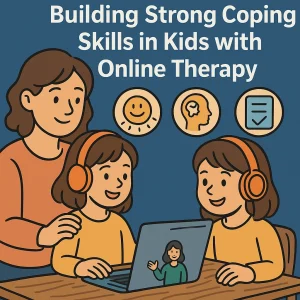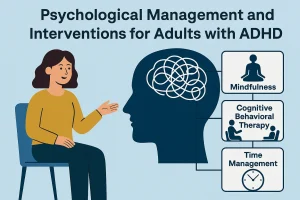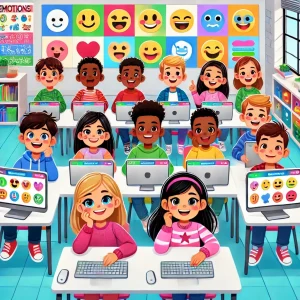Interactive Online Activities to Enhance Social Skills
Last Updated: August 28, 2024
In today’s connected world, strong social skills are essential for every child’s growth—whether in the classroom, at home, or in peer interactions. Building these skills early lays the foundation for confident communication, empathy, and collaboration. Our practical guide to social skills activities offers fun and effective ways to boost emotional intelligence, teamwork, and conversational ability—especially through interactive games, role-playing, stories, and projects. As screen time rises, incorporating online social skills training becomes not just convenient, but powerful.
Help your child build confidence, connection, and communication skills with our expert-led online social skills training for kids. Designed to meet your child at their level—anytime, anywhere.
Why Social Skills Matter in the Digital Age
Social skills are foundational to our daily interactions and overall well-being. They help us communicate effectively, build relationships, and navigate complex social situations. For children and teens, these skills are especially crucial as they lay the groundwork for future success in both personal and professional realms.
However, developing social skills has become more challenging in the digital age. With the rise of digital communication and the prevalence of screens, children and teens often miss out on face-to-face interactions. This shift can lead to difficulties in understanding body language, tone, and emotional cues—key components of effective communication. Additionally, the anonymity of online interactions can sometimes lead to misunderstandings and a lack of empathy.
Despite these challenges, the digital world also offers unique opportunities for practicing social skills. Interactive online activities, such as virtual games, video chats, and collaborative projects, provide a flexible and accessible platform for learning. These activities can be tailored to various social scenarios, allowing kids to practice in a safe and controlled environment. For instance, online role-playing games can help children learn empathy by putting themselves in others’ shoes, while digital storytelling can enhance their ability to express and understand emotions.
Engaging Online Activities for Building Social Skills
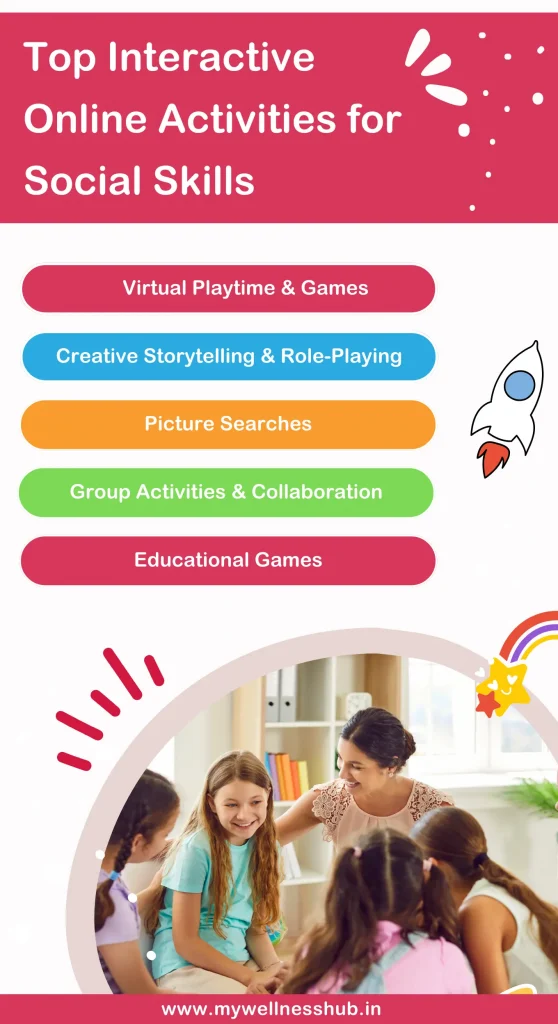
In today’s digital world, interactive online activities for social skills offer a diverse range of opportunities for children and teens to develop essential interpersonal abilities. These activities not only make learning fun but also cater to different learning styles and preferences. Let’s explore some engaging methods that can help enhance social skills through the convenience of online platforms.
Virtual Playtime and Games
Online social skills activities like Staring Contest, Emotion Charades, and Simon Says are excellent ways to teach important social skills in an engaging manner.
- Staring Contest: This simple game helps children practice maintaining eye contact, a key component of effective communication. By focusing solely on maintaining eye contact, children can become more comfortable with this social cue, which is often challenging for many.
- Emotion Charades: In this activity, children act out different emotions while others guess what they are portraying. This helps in recognizing and understanding emotional expressions, which is crucial for empathetic interactions.
- Simon Says: A classic game that teaches impulse control and listening skills. By following the commands only when “Simon says,” children learn to pay attention and control their actions, an important aspect of social interactions.
Creative Online Storytelling and Role-Playing
Interactive virtual activities for social skills, such as Improvisational Stories, Play Pretend, and Dramatic Make-Believe Games, are fantastic tools for developing empathy and perspective-taking.
- Improvisational Stories: Children can create stories on the spot, often incorporating elements provided by others. This activity fosters creativity and encourages them to consider different viewpoints, enhancing their ability to empathize.
- Play Pretend: Engaging in role-playing scenarios, such as pretending to be different characters or professions, allows children to explore various social roles and behaviors. It helps them understand different perspectives and learn appropriate responses in various situations.
- Dramatic Make-Believe Games: These games involve acting out scenarios that require collaboration and communication. They are great for building empathy, as children must think about how their character feels and reacts, as well as how others might perceive them.
Also Read: Boost Kids Storytelling Skills: Engage and Educate at Home
Online Group Activities and Collaboration
Group activities and collaborative projects are invaluable for teaching teamwork and communication. Some excellent options include:
- Virtual Team Building Games: These games encourage collaboration and problem-solving. For example, escape room games or treasure hunts require participants to work together to achieve a common goal, enhancing their cooperative skills.
- Group Projects: Online platforms can facilitate group projects where children work together on a shared task. Whether it’s creating a digital presentation or a collaborative artwork, these projects teach the importance of communication and coordination.
- Cooperative Drawing: In this activity, children take turns adding to a drawing, either in a virtual whiteboard environment or using online drawing tools. It promotes creative collaboration and helps children learn to appreciate others’ contributions.
Interactive Educational Games
Educational games can be both fun and instructional, offering children a chance to practice social skills in a structured environment.
- Decision-Making Games: These games present scenarios where children must make choices, helping them develop critical thinking and decision-making skills. For instance, games that simulate real-life situations, such as managing a virtual store or navigating social dilemmas, can teach important lessons about consequences and responsibilities.
- Name Game: This simple game involves calling out names while passing a ball or other object. It helps children learn to remember and use names, an important aspect of social interactions.
- Rhythm Games: Music-based games can teach rhythm and coordination while also encouraging participation and teamwork. These games often require players to follow along with a beat or rhythm, fostering listening skills and cooperation.
Recommended Online Activities by Age Group
| Age Group | Recommended Activities | Description of Activities | Benefits |
|---|---|---|---|
| Young Children | Staring Contest Emotion Charades | – Children take turns staring at each other, focusing on maintaining eye contact without laughing or looking away. – Players act out different emotions without speaking while others guess the emotion. | – Improves eye contact and attention span – Helps recognize and understand emotions |
| School-Age Children | Simon Says Improvisational Stories | A leader gives commands (e.g., “Simon says touch your nose”), and players must only follow the command if prefaced with “Simon says.” Participants create spontaneous stories based on prompts or selected themes, often taking turns to add to the narrative. | – Enhances listening skills and impulse control – Boosts creativity and collaboration skills |
| Teens | Virtual Team Building Games Decision-Making Games | Online games designed to require teamwork, such as virtual escape rooms or group problem-solving challenges. Games that present scenarios requiring players to make choices, often with consequences that impact the outcome (e.g., managing a virtual business or community). | – Promotes teamwork and communication – Develops critical thinking and decision-making skills |
Tips for Parents and Educators
When it comes to implementing digital social skills exercises and online social skills training, parents and educators play a crucial role in guiding children through these activities. Here are some practical tips to ensure that these exercises are effective and safe, while also making the learning process enjoyable and engaging.
1. Choose Age-Appropriate Activities
Select activities that are suitable for the child’s age and developmental level. Younger children may benefit from simpler games like Staring Contest or Emotion Charades, while older kids and teens might enjoy more complex tasks such as Virtual Team Building Games or Dramatic Make-Believe Games. It’s important to match the activity’s complexity with the child’s ability to understand and engage.
2. Monitor and Guide Online Interactions
While online platforms offer a wide range of activities, it’s essential to monitor and guide children’s interactions. Encourage positive behavior and help them understand appropriate online etiquette. Be present during online sessions, especially for younger children, to ensure they are interacting safely and respectfully. This guidance helps in reinforcing positive social skills and correcting any misunderstandings.
3. Encourage Participation and Engagement
Motivate children to participate actively in these activities. Whether it’s taking turns in a game or contributing to a group project, active engagement is key to developing social skills. Encourage them to express their thoughts and feelings during these sessions, which can help in building confidence and communication abilities.
4. Use Structured and Safe Platforms
Select platforms that offer structured activities and safe environments. Many educational websites and apps are designed with child safety in mind, providing a controlled setting where children can interact and learn. Look for platforms that have good reviews and are recommended by educators. For example, Wellness Hub offers various resources and activities tailored to children’s developmental needs, ensuring a safe and structured learning experience.
5. Set Clear Expectations and Boundaries
Establish clear expectations and boundaries for online activities. This includes setting time limits for screen use, defining appropriate online behavior, and discussing the importance of privacy. By setting these guidelines, children can learn to use digital tools responsibly and respect the boundaries of others.
6. Provide Feedback and Encouragement
Give constructive feedback and encouragement during and after activities. Acknowledge the effort and progress made, and gently guide them towards improvement where necessary. Positive reinforcement can boost confidence and motivation, making children more likely to engage in future activities.
7. Incorporate Real-Life Practice
Complement online activities with real-life practice. Encourage children to apply the social skills they’ve learned online in everyday situations. For example, they can use the empathy gained from role-playing games in real-life interactions with friends and family. This helps in reinforcing the skills and making them more applicable in various contexts.
Benefits of Online Social Skills Activities
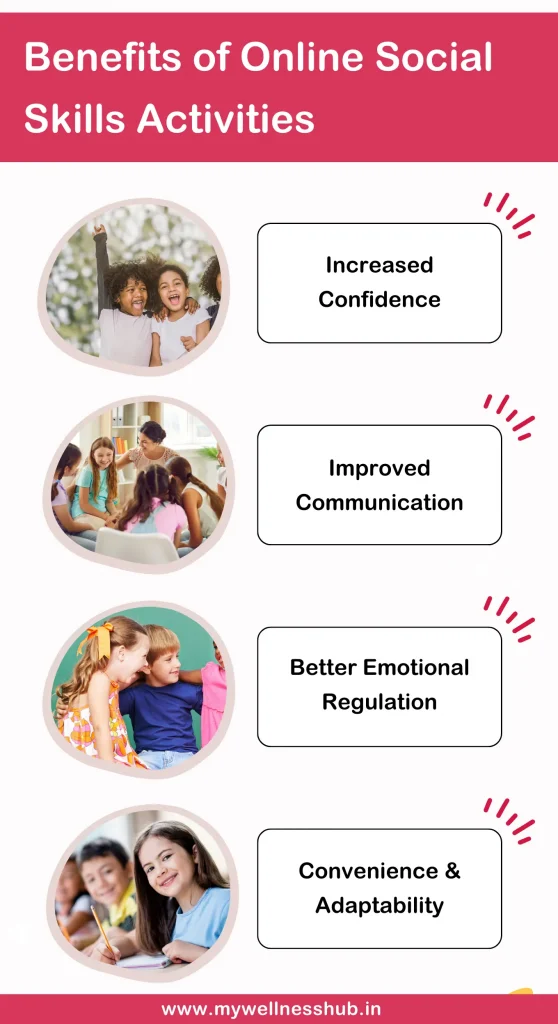
Online tools and activities for building social skills in teens offer numerous advantages, making them a valuable resource for parents and educators. These activities provide a convenient and adaptable way to help young people develop essential social skills, regardless of their age or location. Let’s explore some of the key benefits of engaging in online social skills activities.
1. Increased Confidence
Participating in online social skills activities can significantly boost a child’s confidence. Online platforms often provide a low-pressure environment where children and teens can practice social interactions without the fear of immediate judgment. This setting allows them to experiment with different ways of communicating, helping them become more self-assured in their abilities. As they become more comfortable expressing themselves, this newfound confidence often translates into real-world situations, enhancing their overall social presence.
2. Improved Communication Skills
One of the primary goals of social skills activities is to improve communication. Online platforms offer a range of tools and exercises that focus on various aspects of communication, such as active listening, verbal expression, and non-verbal cues. For example, games like Emotion Charades and Improvisational Stories encourage participants to articulate their thoughts and emotions clearly. These activities help children learn to interpret and respond to others’ emotions, fostering empathy and understanding.
3. Better Emotional Regulation
Online activities often include scenarios that require children to manage their emotions, such as dealing with winning or losing in games or handling disagreements during group projects. These experiences teach valuable lessons in emotional regulation, helping children learn how to stay calm and composed in different situations. By practicing these skills in a controlled environment, children can better navigate emotional challenges in their everyday lives.
4. Convenience and Adaptability
One of the standout benefits of online social skills activities is their convenience and adaptability. These activities can be accessed from anywhere, making them ideal for busy families or those with limited access to in-person social opportunities. Online platforms can cater to various age groups and developmental stages, offering a wide range of activities that can be tailored to individual needs. Whether it’s a young child learning to take turns or a teen developing advanced communication skills, online resources can provide appropriate and engaging content.
Challenges and Considerations
While interactive online activities for social skills offer numerous benefits, it’s important to consider potential challenges and how to address them. By being aware of these issues and taking proactive steps, parents and educators can ensure that online learning is both effective and safe for children.
Screen Time Limits
One of the primary concerns with online activities is managing screen time. Excessive screen time can lead to issues such as eye strain, disrupted sleep patterns, and reduced physical activity. To mitigate these risks, it’s crucial to set specific times for online activities. Establishing a daily or weekly schedule helps balance screen time with other essential activities, such as outdoor play, reading, and family interactions.
Solution: Set clear guidelines for screen time based on the child’s age and needs. For example, younger children may benefit from shorter sessions with breaks in between, while older kids can handle longer periods with structured activities. Parents and educators can use tools like timers or apps to monitor and manage screen time effectively.
Know more: How does screen time affect your child’s development?
Need for Supervision
Online platforms, while convenient, can sometimes expose children to inappropriate content or interactions. Supervision is necessary to ensure that children engage with safe and age-appropriate material. Additionally, guidance during online activities can enhance learning by providing immediate feedback and support.
Solution: Choose reputable platforms that offer safe environments for children, such as those with parental controls and content filters. Actively participate in the activities with younger children, providing guidance and addressing any questions or concerns they may have. For older children, discuss online safety rules and encourage open communication about their online experiences.
Choosing Appropriate Content
With the vast array of online activities available, selecting the right content can be challenging. It’s essential to choose activities that are not only engaging but also educational and aligned with the child’s developmental stage.
Solution: Prioritize quality over quantity by selecting well-reviewed and recommended resources. Look for activities that have clear learning objectives and align with your child’s interests and needs.
Balancing Screen Time and Offline Activities
| Activity Type | Recommended Duration | Examples | Description |
|---|---|---|---|
| Online Activities | 30-60 minutes per session | Virtual games, storytelling Educational apps, video calls | Engaging in digital games and interactive storytelling sessions that promote social skills, creativity, and cognitive development. Using educational applications for learning and connecting with peers or family members through video calls to build communication skills. |
| Offline Activities | 1-2 hours daily | – Outdoor play, exercise – Reading, arts and crafts Family time, board games | Physical activities like playing outside, sports, or simple exercises to promote physical health and social interaction. Engaging in reading books, drawing, painting, or other creative arts to foster imagination, relaxation, and fine motor skills. Spending quality time with family, playing board games, or doing household chores together to strengthen family bonds and teamwork. |
Conclusion
Developing social skills through interactive online activities is a great way for children and teens to learn and practice important interpersonal skills. These activities, such as virtual games, storytelling, and group projects, provide a fun and engaging way to build confidence, improve communication, and manage emotions. They are easily accessible and can be tailored to suit different age groups, making them a convenient option for parents and educators. While it’s important to manage screen time and ensure children are accessing safe content, these challenges can be addressed with proper planning and supervision.
We encourage you to explore these activities with your children to support their social development. At Wellness Hub, we offer a range of programs designed to help children develop social skills in a supportive environment. By using these resources, you can help your child navigate social interactions more confidently, both online and in real life. The goal is to make learning enjoyable and relevant, so children feel comfortable and capable in their social interactions. With the right tools and support, your child can thrive in a world where digital and real-life experiences are intertwined.
Frequently Asked Questions:
1. What are interactive online activities for social skills?
Interactive online activities for social skills are virtual exercises and games designed to help children and teens develop important interpersonal skills. These activities include games like Emotion Charades, virtual storytelling, and group projects that teach communication, empathy, and cooperation.
2. How can online activities help improve social skills in children?
Online activities can help improve social skills in children by providing a safe and engaging environment to practice communication, emotional regulation, and teamwork. These activities often simulate real-life social situations, allowing children to develop confidence and better understand social cues.
3. What are some examples of online social skills activities?
Examples of online social skills activities include virtual games like Staring Contest and Simon Says, creative storytelling and role-playing games, and collaborative projects like virtual team-building exercises and cooperative drawing.
4. Are online social skills activities suitable for all age groups?
Yes, online social skills activities can be tailored to suit different age groups. Younger children can benefit from simpler games and activities, while older kids and teens can engage in more complex exercises that challenge their communication and empathy skills.
5. How much screen time should children have for online social skills activities?
It’s important to balance screen time with other activities. Setting specific times for online activities, based on the child’s age and needs, can help manage screen time effectively. For example, shorter sessions with breaks for younger children and structured activities for older kids are recommended.
6. How can parents ensure the safety of their children during online social skills activities?
Parents can ensure the safety of their children by choosing reputable platforms with parental controls and content filters, supervising online interactions, and discussing online safety rules with their children. Active participation and monitoring can also help guide children in making safe and appropriate choices online.
7. What are the benefits of using online tools and activities for building social skills?
The benefits include increased confidence, improved communication skills, and better emotional regulation. Online tools offer convenience and adaptability, allowing children to practice social skills in a comfortable environment and at their own pace.
8. Can online social skills activities replace in-person interactions?
While online activities are a valuable tool for developing social skills, they should complement, not replace, in-person interactions. Real-life practice is essential for applying and reinforcing the skills learned online in everyday situations.
9. How can Wellness Hub help with online social skills activities?
Wellness Hub offers a variety of programs and resources designed to support the development of social skills. These include expert-designed activities and tools that cater to different age groups and developmental stages, providing a safe and structured learning environment for children.
10. What should parents consider when choosing online social skills activities?
Parents should consider the child’s age, developmental level, and interests when choosing online social skills activities. It’s also important to select activities that are engaging, educational, and provided by reputable sources. Setting clear guidelines and monitoring progress can enhance the learning experience.
About Author:
Lasya Vooturi,
Clinical Psychologist (A) & Behavioral Therapist
Lasya holds a Professional Diploma in Clinical Psychology from Amity University, where she deepened her understanding of psychological principles from March 2023 to March 2024. With over a year of dedicated experience as a Behavioral Therapist, Lasya has honed her skills in applying effective therapy techniques tailored to individual needs. Fluent in Telugu, Hindi, and English, she is adept at connecting with a diverse range of clients, ensuring comprehensive communication and understanding. Lasya’s approach is grounded in empathy and scientific rigor, making her a trusted ally in navigating mental health challenges.
Book your Free Consultation Today
Parent/Caregiver Info:
Client’s Details:
* Error Message
